Importance of Strait of Hormuz in Global Trade - Doc
VerifiedAdded on 2021/01/02
|13
|4565
|236
AI Summary
Contribute Materials
Your contribution can guide someone’s learning journey. Share your
documents today.
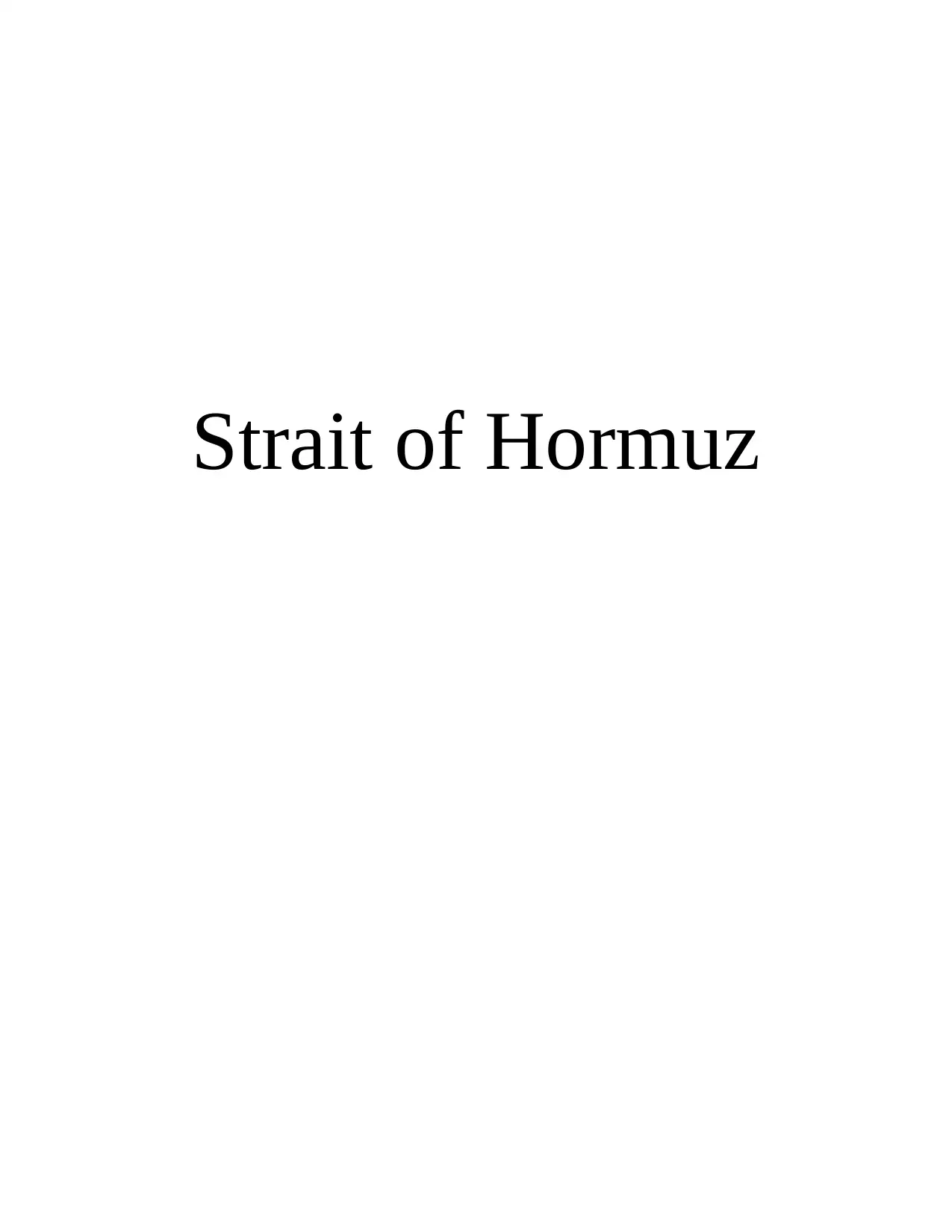
Strait of Hormuz
Secure Best Marks with AI Grader
Need help grading? Try our AI Grader for instant feedback on your assignments.
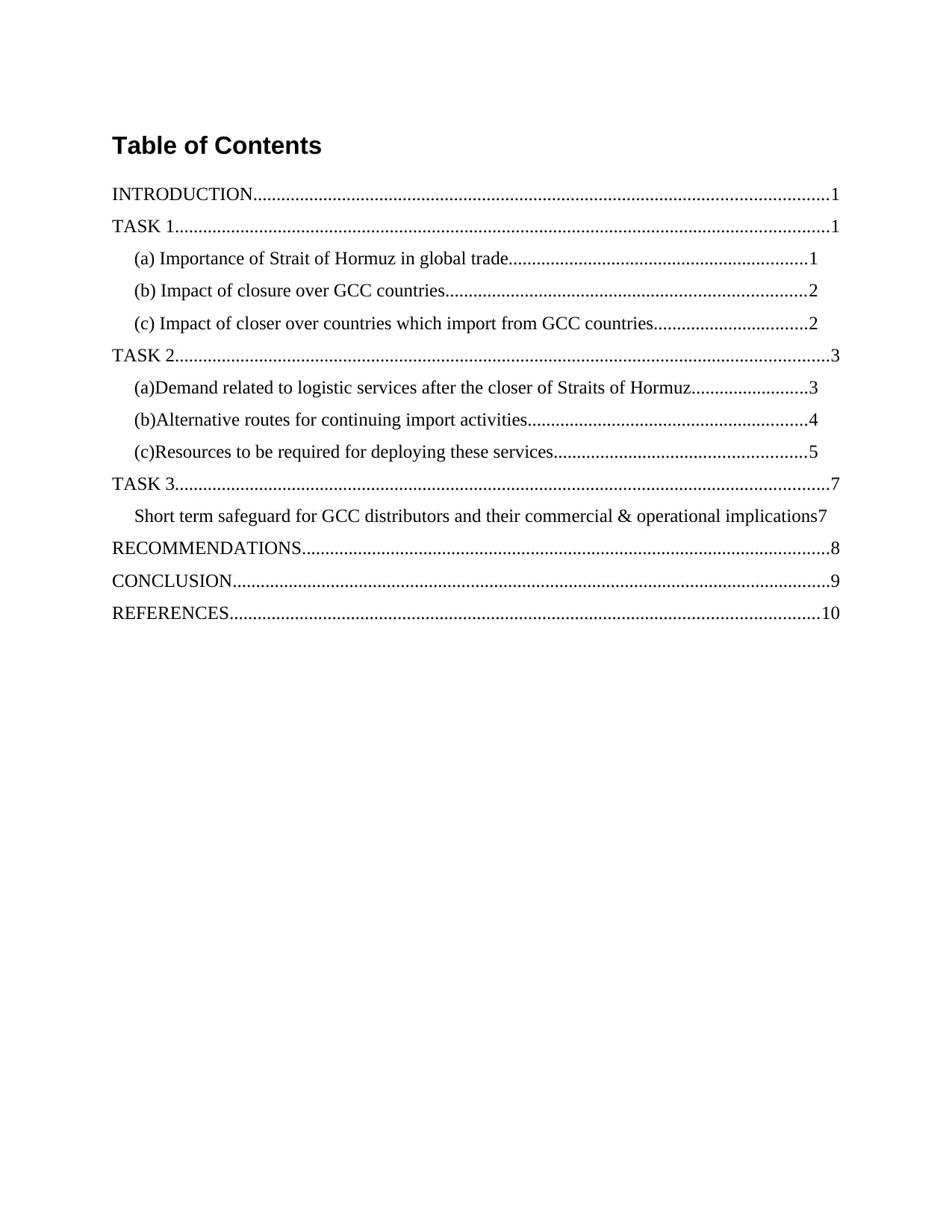
Table of Contents
INTRODUCTION...........................................................................................................................1
TASK 1............................................................................................................................................1
(a) Importance of Strait of Hormuz in global trade................................................................1
(b) Impact of closure over GCC countries.............................................................................2
(c) Impact of closer over countries which import from GCC countries.................................2
TASK 2............................................................................................................................................3
(a)Demand related to logistic services after the closer of Straits of Hormuz.........................3
(b)Alternative routes for continuing import activities............................................................4
(c)Resources to be required for deploying these services......................................................5
TASK 3............................................................................................................................................7
Short term safeguard for GCC distributors and their commercial & operational implications7
RECOMMENDATIONS.................................................................................................................8
CONCLUSION................................................................................................................................9
REFERENCES..............................................................................................................................10
INTRODUCTION...........................................................................................................................1
TASK 1............................................................................................................................................1
(a) Importance of Strait of Hormuz in global trade................................................................1
(b) Impact of closure over GCC countries.............................................................................2
(c) Impact of closer over countries which import from GCC countries.................................2
TASK 2............................................................................................................................................3
(a)Demand related to logistic services after the closer of Straits of Hormuz.........................3
(b)Alternative routes for continuing import activities............................................................4
(c)Resources to be required for deploying these services......................................................5
TASK 3............................................................................................................................................7
Short term safeguard for GCC distributors and their commercial & operational implications7
RECOMMENDATIONS.................................................................................................................8
CONCLUSION................................................................................................................................9
REFERENCES..............................................................................................................................10
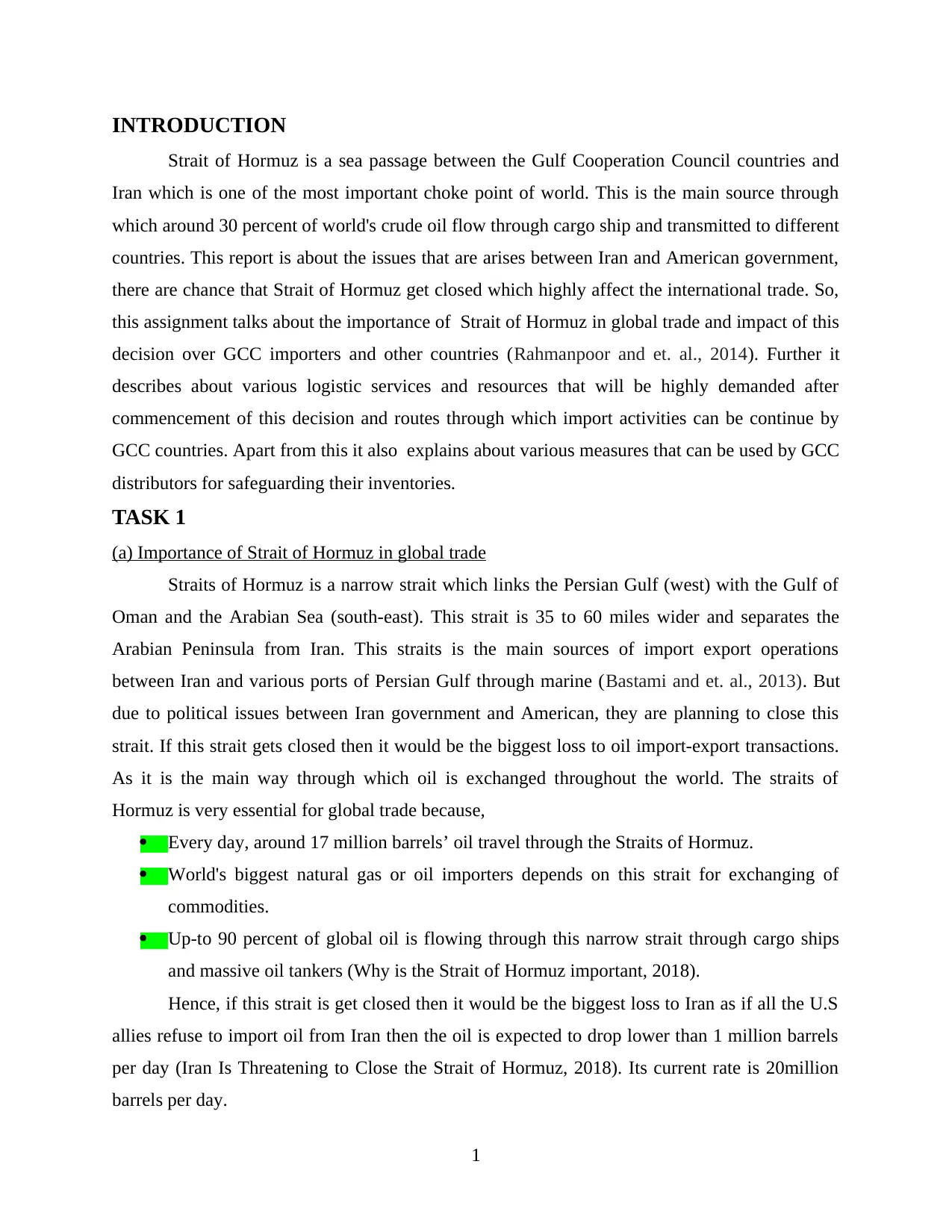
INTRODUCTION
Strait of Hormuz is a sea passage between the Gulf Cooperation Council countries and
Iran which is one of the most important choke point of world. This is the main source through
which around 30 percent of world's crude oil flow through cargo ship and transmitted to different
countries. This report is about the issues that are arises between Iran and American government,
there are chance that Strait of Hormuz get closed which highly affect the international trade. So,
this assignment talks about the importance of Strait of Hormuz in global trade and impact of this
decision over GCC importers and other countries (Rahmanpoor and et. al., 2014). Further it
describes about various logistic services and resources that will be highly demanded after
commencement of this decision and routes through which import activities can be continue by
GCC countries. Apart from this it also explains about various measures that can be used by GCC
distributors for safeguarding their inventories.
TASK 1
(a) Importance of Strait of Hormuz in global trade
Straits of Hormuz is a narrow strait which links the Persian Gulf (west) with the Gulf of
Oman and the Arabian Sea (south-east). This strait is 35 to 60 miles wider and separates the
Arabian Peninsula from Iran. This straits is the main sources of import export operations
between Iran and various ports of Persian Gulf through marine (Bastami and et. al., 2013). But
due to political issues between Iran government and American, they are planning to close this
strait. If this strait gets closed then it would be the biggest loss to oil import-export transactions.
As it is the main way through which oil is exchanged throughout the world. The straits of
Hormuz is very essential for global trade because,
Every day, around 17 million barrels’ oil travel through the Straits of Hormuz.
World's biggest natural gas or oil importers depends on this strait for exchanging of
commodities.
Up-to 90 percent of global oil is flowing through this narrow strait through cargo ships
and massive oil tankers (Why is the Strait of Hormuz important, 2018).
Hence, if this strait is get closed then it would be the biggest loss to Iran as if all the U.S
allies refuse to import oil from Iran then the oil is expected to drop lower than 1 million barrels
per day (Iran Is Threatening to Close the Strait of Hormuz, 2018). Its current rate is 20million
barrels per day.
1
Strait of Hormuz is a sea passage between the Gulf Cooperation Council countries and
Iran which is one of the most important choke point of world. This is the main source through
which around 30 percent of world's crude oil flow through cargo ship and transmitted to different
countries. This report is about the issues that are arises between Iran and American government,
there are chance that Strait of Hormuz get closed which highly affect the international trade. So,
this assignment talks about the importance of Strait of Hormuz in global trade and impact of this
decision over GCC importers and other countries (Rahmanpoor and et. al., 2014). Further it
describes about various logistic services and resources that will be highly demanded after
commencement of this decision and routes through which import activities can be continue by
GCC countries. Apart from this it also explains about various measures that can be used by GCC
distributors for safeguarding their inventories.
TASK 1
(a) Importance of Strait of Hormuz in global trade
Straits of Hormuz is a narrow strait which links the Persian Gulf (west) with the Gulf of
Oman and the Arabian Sea (south-east). This strait is 35 to 60 miles wider and separates the
Arabian Peninsula from Iran. This straits is the main sources of import export operations
between Iran and various ports of Persian Gulf through marine (Bastami and et. al., 2013). But
due to political issues between Iran government and American, they are planning to close this
strait. If this strait gets closed then it would be the biggest loss to oil import-export transactions.
As it is the main way through which oil is exchanged throughout the world. The straits of
Hormuz is very essential for global trade because,
Every day, around 17 million barrels’ oil travel through the Straits of Hormuz.
World's biggest natural gas or oil importers depends on this strait for exchanging of
commodities.
Up-to 90 percent of global oil is flowing through this narrow strait through cargo ships
and massive oil tankers (Why is the Strait of Hormuz important, 2018).
Hence, if this strait is get closed then it would be the biggest loss to Iran as if all the U.S
allies refuse to import oil from Iran then the oil is expected to drop lower than 1 million barrels
per day (Iran Is Threatening to Close the Strait of Hormuz, 2018). Its current rate is 20million
barrels per day.
1
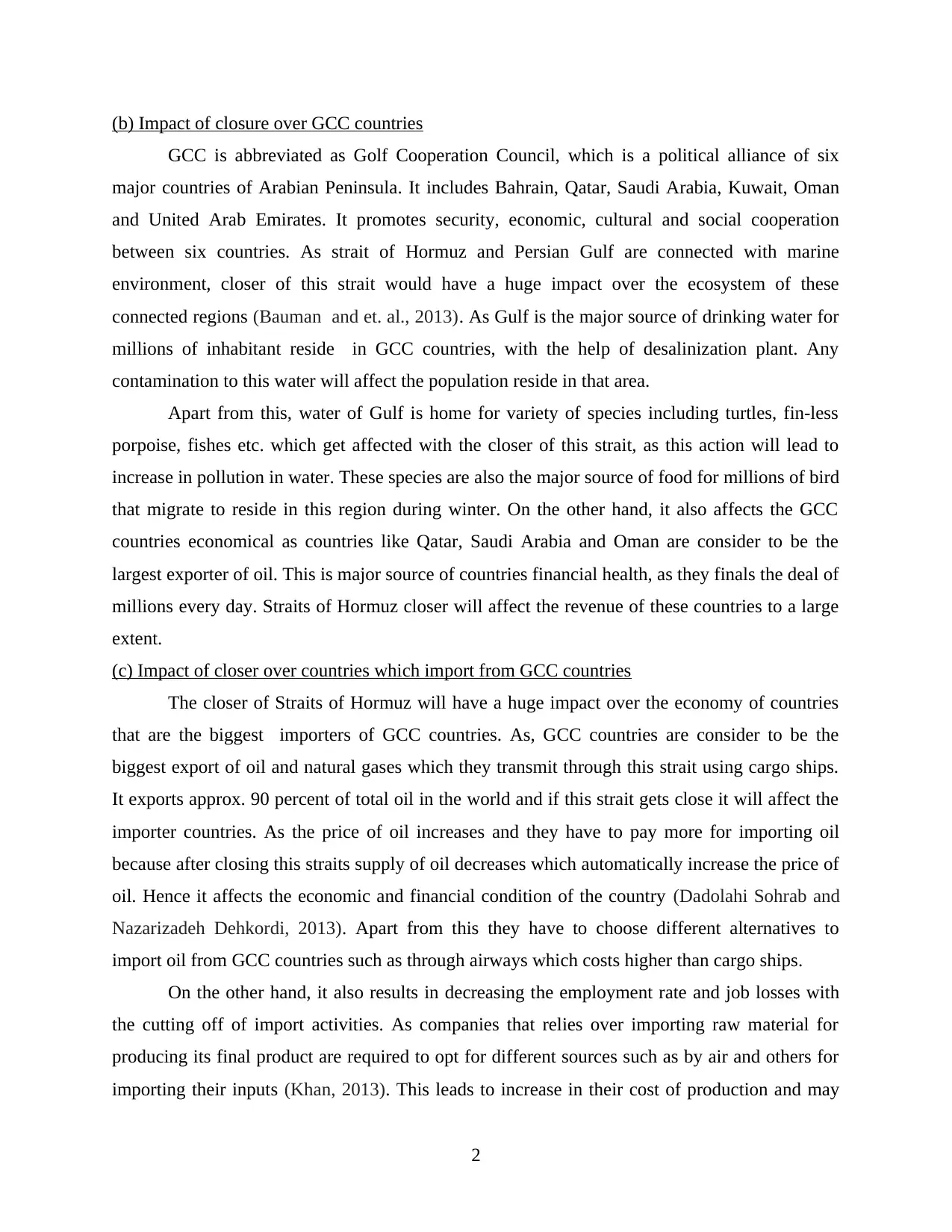
(b) Impact of closure over GCC countries
GCC is abbreviated as Golf Cooperation Council, which is a political alliance of six
major countries of Arabian Peninsula. It includes Bahrain, Qatar, Saudi Arabia, Kuwait, Oman
and United Arab Emirates. It promotes security, economic, cultural and social cooperation
between six countries. As strait of Hormuz and Persian Gulf are connected with marine
environment, closer of this strait would have a huge impact over the ecosystem of these
connected regions (Bauman and et. al., 2013). As Gulf is the major source of drinking water for
millions of inhabitant reside in GCC countries, with the help of desalinization plant. Any
contamination to this water will affect the population reside in that area.
Apart from this, water of Gulf is home for variety of species including turtles, fin-less
porpoise, fishes etc. which get affected with the closer of this strait, as this action will lead to
increase in pollution in water. These species are also the major source of food for millions of bird
that migrate to reside in this region during winter. On the other hand, it also affects the GCC
countries economical as countries like Qatar, Saudi Arabia and Oman are consider to be the
largest exporter of oil. This is major source of countries financial health, as they finals the deal of
millions every day. Straits of Hormuz closer will affect the revenue of these countries to a large
extent.
(c) Impact of closer over countries which import from GCC countries
The closer of Straits of Hormuz will have a huge impact over the economy of countries
that are the biggest importers of GCC countries. As, GCC countries are consider to be the
biggest export of oil and natural gases which they transmit through this strait using cargo ships.
It exports approx. 90 percent of total oil in the world and if this strait gets close it will affect the
importer countries. As the price of oil increases and they have to pay more for importing oil
because after closing this straits supply of oil decreases which automatically increase the price of
oil. Hence it affects the economic and financial condition of the country (Dadolahi Sohrab and
Nazarizadeh Dehkordi, 2013). Apart from this they have to choose different alternatives to
import oil from GCC countries such as through airways which costs higher than cargo ships.
On the other hand, it also results in decreasing the employment rate and job losses with
the cutting off of import activities. As companies that relies over importing raw material for
producing its final product are required to opt for different sources such as by air and others for
importing their inputs (Khan, 2013). This leads to increase in their cost of production and may
2
GCC is abbreviated as Golf Cooperation Council, which is a political alliance of six
major countries of Arabian Peninsula. It includes Bahrain, Qatar, Saudi Arabia, Kuwait, Oman
and United Arab Emirates. It promotes security, economic, cultural and social cooperation
between six countries. As strait of Hormuz and Persian Gulf are connected with marine
environment, closer of this strait would have a huge impact over the ecosystem of these
connected regions (Bauman and et. al., 2013). As Gulf is the major source of drinking water for
millions of inhabitant reside in GCC countries, with the help of desalinization plant. Any
contamination to this water will affect the population reside in that area.
Apart from this, water of Gulf is home for variety of species including turtles, fin-less
porpoise, fishes etc. which get affected with the closer of this strait, as this action will lead to
increase in pollution in water. These species are also the major source of food for millions of bird
that migrate to reside in this region during winter. On the other hand, it also affects the GCC
countries economical as countries like Qatar, Saudi Arabia and Oman are consider to be the
largest exporter of oil. This is major source of countries financial health, as they finals the deal of
millions every day. Straits of Hormuz closer will affect the revenue of these countries to a large
extent.
(c) Impact of closer over countries which import from GCC countries
The closer of Straits of Hormuz will have a huge impact over the economy of countries
that are the biggest importers of GCC countries. As, GCC countries are consider to be the
biggest export of oil and natural gases which they transmit through this strait using cargo ships.
It exports approx. 90 percent of total oil in the world and if this strait gets close it will affect the
importer countries. As the price of oil increases and they have to pay more for importing oil
because after closing this straits supply of oil decreases which automatically increase the price of
oil. Hence it affects the economic and financial condition of the country (Dadolahi Sohrab and
Nazarizadeh Dehkordi, 2013). Apart from this they have to choose different alternatives to
import oil from GCC countries such as through airways which costs higher than cargo ships.
On the other hand, it also results in decreasing the employment rate and job losses with
the cutting off of import activities. As companies that relies over importing raw material for
producing its final product are required to opt for different sources such as by air and others for
importing their inputs (Khan, 2013). This leads to increase in their cost of production and may
2
Secure Best Marks with AI Grader
Need help grading? Try our AI Grader for instant feedback on your assignments.
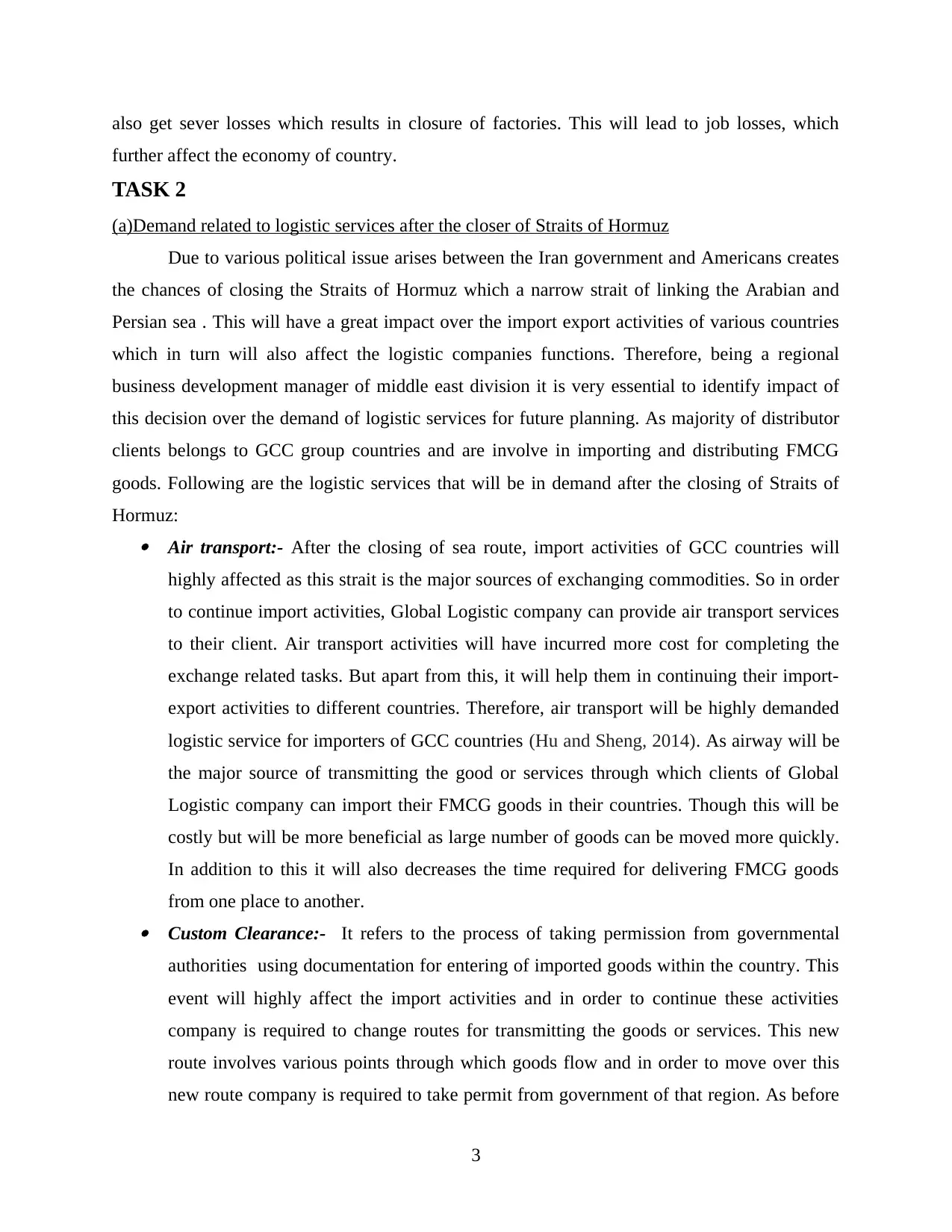
also get sever losses which results in closure of factories. This will lead to job losses, which
further affect the economy of country.
TASK 2
(a)Demand related to logistic services after the closer of Straits of Hormuz
Due to various political issue arises between the Iran government and Americans creates
the chances of closing the Straits of Hormuz which a narrow strait of linking the Arabian and
Persian sea . This will have a great impact over the import export activities of various countries
which in turn will also affect the logistic companies functions. Therefore, being a regional
business development manager of middle east division it is very essential to identify impact of
this decision over the demand of logistic services for future planning. As majority of distributor
clients belongs to GCC group countries and are involve in importing and distributing FMCG
goods. Following are the logistic services that will be in demand after the closing of Straits of
Hormuz: Air transport:- After the closing of sea route, import activities of GCC countries will
highly affected as this strait is the major sources of exchanging commodities. So in order
to continue import activities, Global Logistic company can provide air transport services
to their client. Air transport activities will have incurred more cost for completing the
exchange related tasks. But apart from this, it will help them in continuing their import-
export activities to different countries. Therefore, air transport will be highly demanded
logistic service for importers of GCC countries (Hu and Sheng, 2014). As airway will be
the major source of transmitting the good or services through which clients of Global
Logistic company can import their FMCG goods in their countries. Though this will be
costly but will be more beneficial as large number of goods can be moved more quickly.
In addition to this it will also decreases the time required for delivering FMCG goods
from one place to another. Custom Clearance:- It refers to the process of taking permission from governmental
authorities using documentation for entering of imported goods within the country. This
event will highly affect the import activities and in order to continue these activities
company is required to change routes for transmitting the goods or services. This new
route involves various points through which goods flow and in order to move over this
new route company is required to take permit from government of that region. As before
3
further affect the economy of country.
TASK 2
(a)Demand related to logistic services after the closer of Straits of Hormuz
Due to various political issue arises between the Iran government and Americans creates
the chances of closing the Straits of Hormuz which a narrow strait of linking the Arabian and
Persian sea . This will have a great impact over the import export activities of various countries
which in turn will also affect the logistic companies functions. Therefore, being a regional
business development manager of middle east division it is very essential to identify impact of
this decision over the demand of logistic services for future planning. As majority of distributor
clients belongs to GCC group countries and are involve in importing and distributing FMCG
goods. Following are the logistic services that will be in demand after the closing of Straits of
Hormuz: Air transport:- After the closing of sea route, import activities of GCC countries will
highly affected as this strait is the major sources of exchanging commodities. So in order
to continue import activities, Global Logistic company can provide air transport services
to their client. Air transport activities will have incurred more cost for completing the
exchange related tasks. But apart from this, it will help them in continuing their import-
export activities to different countries. Therefore, air transport will be highly demanded
logistic service for importers of GCC countries (Hu and Sheng, 2014). As airway will be
the major source of transmitting the good or services through which clients of Global
Logistic company can import their FMCG goods in their countries. Though this will be
costly but will be more beneficial as large number of goods can be moved more quickly.
In addition to this it will also decreases the time required for delivering FMCG goods
from one place to another. Custom Clearance:- It refers to the process of taking permission from governmental
authorities using documentation for entering of imported goods within the country. This
event will highly affect the import activities and in order to continue these activities
company is required to change routes for transmitting the goods or services. This new
route involves various points through which goods flow and in order to move over this
new route company is required to take permit from government of that region. As before
3
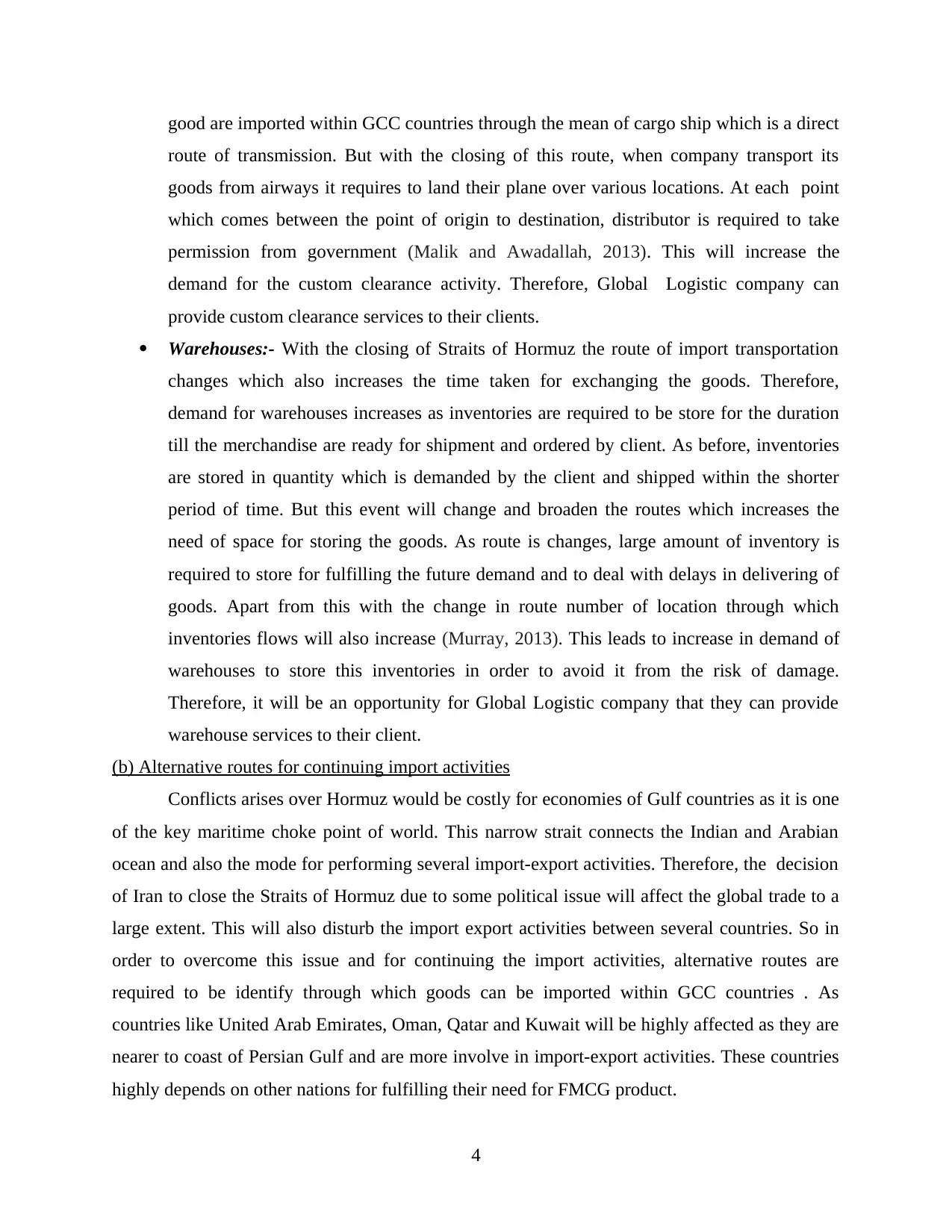
good are imported within GCC countries through the mean of cargo ship which is a direct
route of transmission. But with the closing of this route, when company transport its
goods from airways it requires to land their plane over various locations. At each point
which comes between the point of origin to destination, distributor is required to take
permission from government (Malik and Awadallah, 2013). This will increase the
demand for the custom clearance activity. Therefore, Global Logistic company can
provide custom clearance services to their clients.
Warehouses:- With the closing of Straits of Hormuz the route of import transportation
changes which also increases the time taken for exchanging the goods. Therefore,
demand for warehouses increases as inventories are required to be store for the duration
till the merchandise are ready for shipment and ordered by client. As before, inventories
are stored in quantity which is demanded by the client and shipped within the shorter
period of time. But this event will change and broaden the routes which increases the
need of space for storing the goods. As route is changes, large amount of inventory is
required to store for fulfilling the future demand and to deal with delays in delivering of
goods. Apart from this with the change in route number of location through which
inventories flows will also increase (Murray, 2013). This leads to increase in demand of
warehouses to store this inventories in order to avoid it from the risk of damage.
Therefore, it will be an opportunity for Global Logistic company that they can provide
warehouse services to their client.
(b) Alternative routes for continuing import activities
Conflicts arises over Hormuz would be costly for economies of Gulf countries as it is one
of the key maritime choke point of world. This narrow strait connects the Indian and Arabian
ocean and also the mode for performing several import-export activities. Therefore, the decision
of Iran to close the Straits of Hormuz due to some political issue will affect the global trade to a
large extent. This will also disturb the import export activities between several countries. So in
order to overcome this issue and for continuing the import activities, alternative routes are
required to be identify through which goods can be imported within GCC countries . As
countries like United Arab Emirates, Oman, Qatar and Kuwait will be highly affected as they are
nearer to coast of Persian Gulf and are more involve in import-export activities. These countries
highly depends on other nations for fulfilling their need for FMCG product.
4
route of transmission. But with the closing of this route, when company transport its
goods from airways it requires to land their plane over various locations. At each point
which comes between the point of origin to destination, distributor is required to take
permission from government (Malik and Awadallah, 2013). This will increase the
demand for the custom clearance activity. Therefore, Global Logistic company can
provide custom clearance services to their clients.
Warehouses:- With the closing of Straits of Hormuz the route of import transportation
changes which also increases the time taken for exchanging the goods. Therefore,
demand for warehouses increases as inventories are required to be store for the duration
till the merchandise are ready for shipment and ordered by client. As before, inventories
are stored in quantity which is demanded by the client and shipped within the shorter
period of time. But this event will change and broaden the routes which increases the
need of space for storing the goods. As route is changes, large amount of inventory is
required to store for fulfilling the future demand and to deal with delays in delivering of
goods. Apart from this with the change in route number of location through which
inventories flows will also increase (Murray, 2013). This leads to increase in demand of
warehouses to store this inventories in order to avoid it from the risk of damage.
Therefore, it will be an opportunity for Global Logistic company that they can provide
warehouse services to their client.
(b) Alternative routes for continuing import activities
Conflicts arises over Hormuz would be costly for economies of Gulf countries as it is one
of the key maritime choke point of world. This narrow strait connects the Indian and Arabian
ocean and also the mode for performing several import-export activities. Therefore, the decision
of Iran to close the Straits of Hormuz due to some political issue will affect the global trade to a
large extent. This will also disturb the import export activities between several countries. So in
order to overcome this issue and for continuing the import activities, alternative routes are
required to be identify through which goods can be imported within GCC countries . As
countries like United Arab Emirates, Oman, Qatar and Kuwait will be highly affected as they are
nearer to coast of Persian Gulf and are more involve in import-export activities. These countries
highly depends on other nations for fulfilling their need for FMCG product.
4
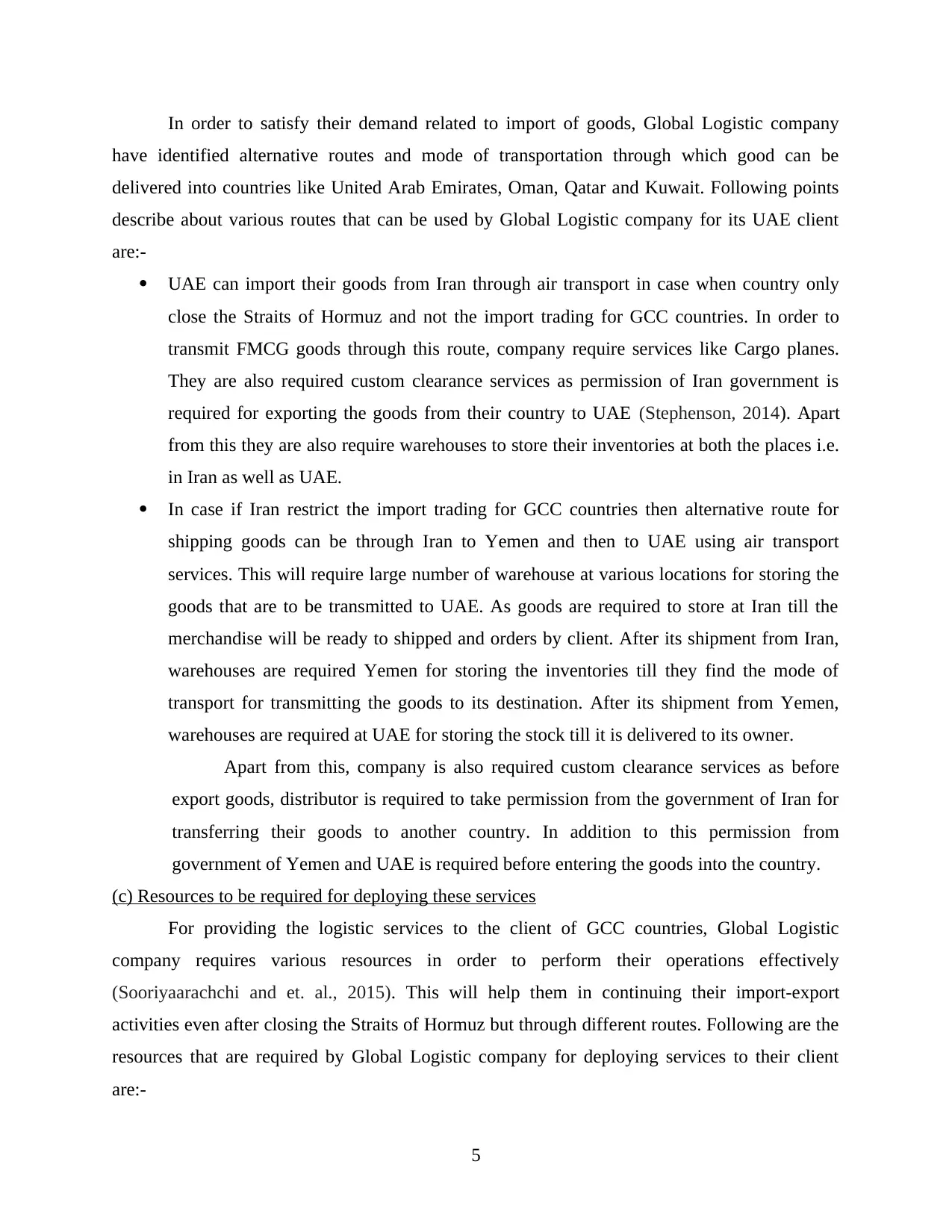
In order to satisfy their demand related to import of goods, Global Logistic company
have identified alternative routes and mode of transportation through which good can be
delivered into countries like United Arab Emirates, Oman, Qatar and Kuwait. Following points
describe about various routes that can be used by Global Logistic company for its UAE client
are:-
UAE can import their goods from Iran through air transport in case when country only
close the Straits of Hormuz and not the import trading for GCC countries. In order to
transmit FMCG goods through this route, company require services like Cargo planes.
They are also required custom clearance services as permission of Iran government is
required for exporting the goods from their country to UAE (Stephenson, 2014). Apart
from this they are also require warehouses to store their inventories at both the places i.e.
in Iran as well as UAE.
In case if Iran restrict the import trading for GCC countries then alternative route for
shipping goods can be through Iran to Yemen and then to UAE using air transport
services. This will require large number of warehouse at various locations for storing the
goods that are to be transmitted to UAE. As goods are required to store at Iran till the
merchandise will be ready to shipped and orders by client. After its shipment from Iran,
warehouses are required Yemen for storing the inventories till they find the mode of
transport for transmitting the goods to its destination. After its shipment from Yemen,
warehouses are required at UAE for storing the stock till it is delivered to its owner.
Apart from this, company is also required custom clearance services as before
export goods, distributor is required to take permission from the government of Iran for
transferring their goods to another country. In addition to this permission from
government of Yemen and UAE is required before entering the goods into the country.
(c) Resources to be required for deploying these services
For providing the logistic services to the client of GCC countries, Global Logistic
company requires various resources in order to perform their operations effectively
(Sooriyaarachchi and et. al., 2015). This will help them in continuing their import-export
activities even after closing the Straits of Hormuz but through different routes. Following are the
resources that are required by Global Logistic company for deploying services to their client
are:-
5
have identified alternative routes and mode of transportation through which good can be
delivered into countries like United Arab Emirates, Oman, Qatar and Kuwait. Following points
describe about various routes that can be used by Global Logistic company for its UAE client
are:-
UAE can import their goods from Iran through air transport in case when country only
close the Straits of Hormuz and not the import trading for GCC countries. In order to
transmit FMCG goods through this route, company require services like Cargo planes.
They are also required custom clearance services as permission of Iran government is
required for exporting the goods from their country to UAE (Stephenson, 2014). Apart
from this they are also require warehouses to store their inventories at both the places i.e.
in Iran as well as UAE.
In case if Iran restrict the import trading for GCC countries then alternative route for
shipping goods can be through Iran to Yemen and then to UAE using air transport
services. This will require large number of warehouse at various locations for storing the
goods that are to be transmitted to UAE. As goods are required to store at Iran till the
merchandise will be ready to shipped and orders by client. After its shipment from Iran,
warehouses are required Yemen for storing the inventories till they find the mode of
transport for transmitting the goods to its destination. After its shipment from Yemen,
warehouses are required at UAE for storing the stock till it is delivered to its owner.
Apart from this, company is also required custom clearance services as before
export goods, distributor is required to take permission from the government of Iran for
transferring their goods to another country. In addition to this permission from
government of Yemen and UAE is required before entering the goods into the country.
(c) Resources to be required for deploying these services
For providing the logistic services to the client of GCC countries, Global Logistic
company requires various resources in order to perform their operations effectively
(Sooriyaarachchi and et. al., 2015). This will help them in continuing their import-export
activities even after closing the Straits of Hormuz but through different routes. Following are the
resources that are required by Global Logistic company for deploying services to their client
are:-
5
Paraphrase This Document
Need a fresh take? Get an instant paraphrase of this document with our AI Paraphraser
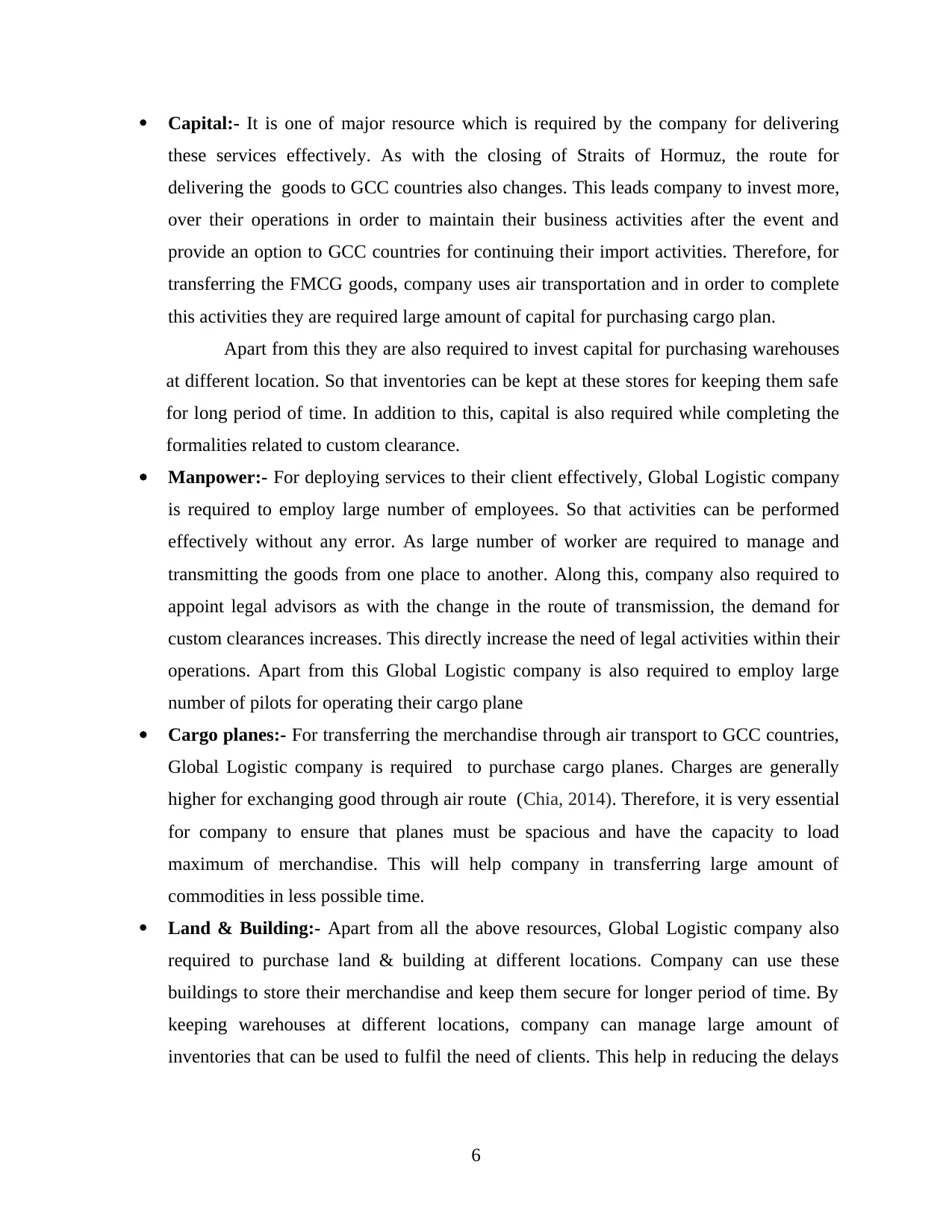
Capital:- It is one of major resource which is required by the company for delivering
these services effectively. As with the closing of Straits of Hormuz, the route for
delivering the goods to GCC countries also changes. This leads company to invest more,
over their operations in order to maintain their business activities after the event and
provide an option to GCC countries for continuing their import activities. Therefore, for
transferring the FMCG goods, company uses air transportation and in order to complete
this activities they are required large amount of capital for purchasing cargo plan.
Apart from this they are also required to invest capital for purchasing warehouses
at different location. So that inventories can be kept at these stores for keeping them safe
for long period of time. In addition to this, capital is also required while completing the
formalities related to custom clearance.
Manpower:- For deploying services to their client effectively, Global Logistic company
is required to employ large number of employees. So that activities can be performed
effectively without any error. As large number of worker are required to manage and
transmitting the goods from one place to another. Along this, company also required to
appoint legal advisors as with the change in the route of transmission, the demand for
custom clearances increases. This directly increase the need of legal activities within their
operations. Apart from this Global Logistic company is also required to employ large
number of pilots for operating their cargo plane
Cargo planes:- For transferring the merchandise through air transport to GCC countries,
Global Logistic company is required to purchase cargo planes. Charges are generally
higher for exchanging good through air route (Chia, 2014). Therefore, it is very essential
for company to ensure that planes must be spacious and have the capacity to load
maximum of merchandise. This will help company in transferring large amount of
commodities in less possible time.
Land & Building:- Apart from all the above resources, Global Logistic company also
required to purchase land & building at different locations. Company can use these
buildings to store their merchandise and keep them secure for longer period of time. By
keeping warehouses at different locations, company can manage large amount of
inventories that can be used to fulfil the need of clients. This help in reducing the delays
6
these services effectively. As with the closing of Straits of Hormuz, the route for
delivering the goods to GCC countries also changes. This leads company to invest more,
over their operations in order to maintain their business activities after the event and
provide an option to GCC countries for continuing their import activities. Therefore, for
transferring the FMCG goods, company uses air transportation and in order to complete
this activities they are required large amount of capital for purchasing cargo plan.
Apart from this they are also required to invest capital for purchasing warehouses
at different location. So that inventories can be kept at these stores for keeping them safe
for long period of time. In addition to this, capital is also required while completing the
formalities related to custom clearance.
Manpower:- For deploying services to their client effectively, Global Logistic company
is required to employ large number of employees. So that activities can be performed
effectively without any error. As large number of worker are required to manage and
transmitting the goods from one place to another. Along this, company also required to
appoint legal advisors as with the change in the route of transmission, the demand for
custom clearances increases. This directly increase the need of legal activities within their
operations. Apart from this Global Logistic company is also required to employ large
number of pilots for operating their cargo plane
Cargo planes:- For transferring the merchandise through air transport to GCC countries,
Global Logistic company is required to purchase cargo planes. Charges are generally
higher for exchanging good through air route (Chia, 2014). Therefore, it is very essential
for company to ensure that planes must be spacious and have the capacity to load
maximum of merchandise. This will help company in transferring large amount of
commodities in less possible time.
Land & Building:- Apart from all the above resources, Global Logistic company also
required to purchase land & building at different locations. Company can use these
buildings to store their merchandise and keep them secure for longer period of time. By
keeping warehouses at different locations, company can manage large amount of
inventories that can be used to fulfil the need of clients. This help in reducing the delays
6
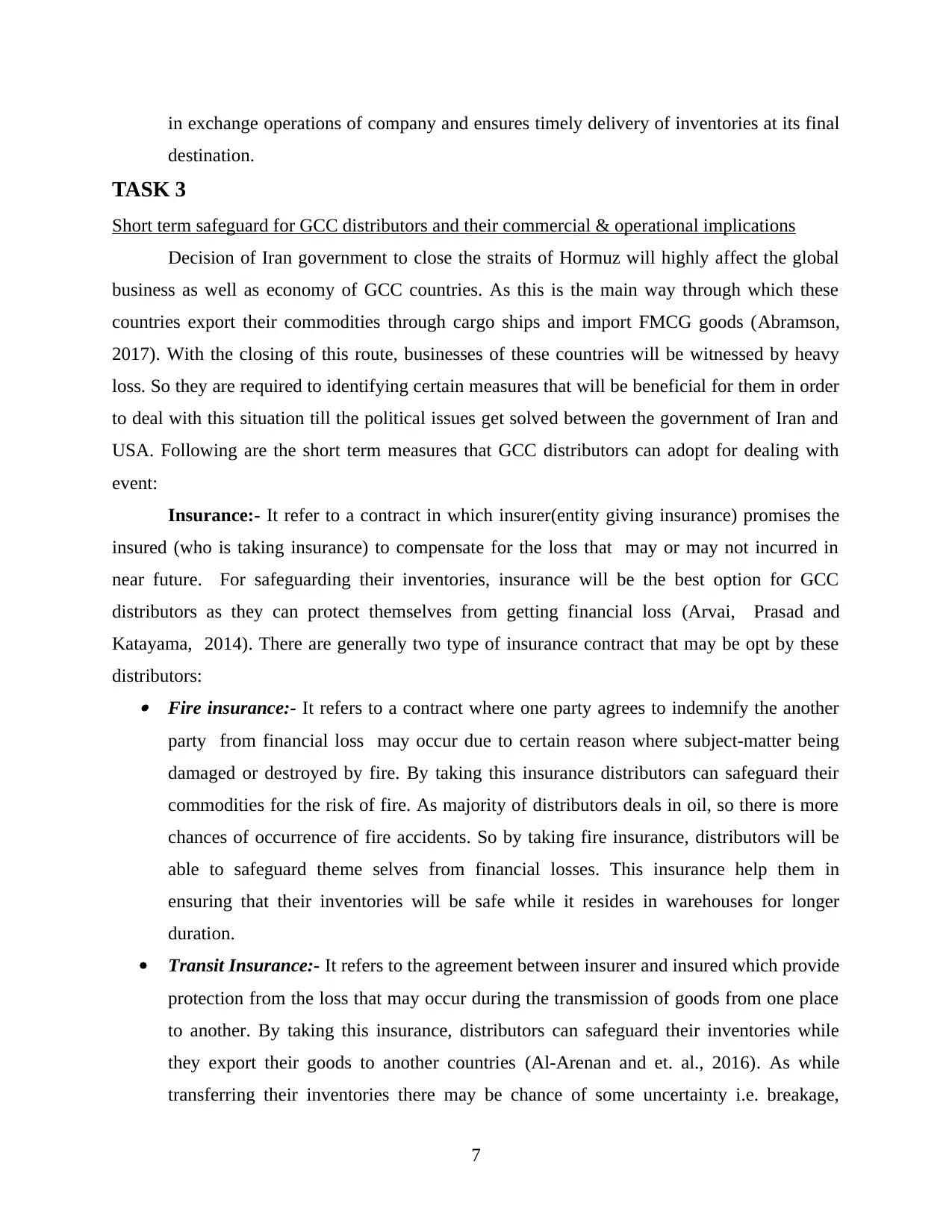
in exchange operations of company and ensures timely delivery of inventories at its final
destination.
TASK 3
Short term safeguard for GCC distributors and their commercial & operational implications
Decision of Iran government to close the straits of Hormuz will highly affect the global
business as well as economy of GCC countries. As this is the main way through which these
countries export their commodities through cargo ships and import FMCG goods (Abramson,
2017). With the closing of this route, businesses of these countries will be witnessed by heavy
loss. So they are required to identifying certain measures that will be beneficial for them in order
to deal with this situation till the political issues get solved between the government of Iran and
USA. Following are the short term measures that GCC distributors can adopt for dealing with
event:
Insurance:- It refer to a contract in which insurer(entity giving insurance) promises the
insured (who is taking insurance) to compensate for the loss that may or may not incurred in
near future. For safeguarding their inventories, insurance will be the best option for GCC
distributors as they can protect themselves from getting financial loss (Arvai, Prasad and
Katayama, 2014). There are generally two type of insurance contract that may be opt by these
distributors: Fire insurance:- It refers to a contract where one party agrees to indemnify the another
party from financial loss may occur due to certain reason where subject-matter being
damaged or destroyed by fire. By taking this insurance distributors can safeguard their
commodities for the risk of fire. As majority of distributors deals in oil, so there is more
chances of occurrence of fire accidents. So by taking fire insurance, distributors will be
able to safeguard theme selves from financial losses. This insurance help them in
ensuring that their inventories will be safe while it resides in warehouses for longer
duration.
Transit Insurance:- It refers to the agreement between insurer and insured which provide
protection from the loss that may occur during the transmission of goods from one place
to another. By taking this insurance, distributors can safeguard their inventories while
they export their goods to another countries (Al-Arenan and et. al., 2016). As while
transferring their inventories there may be chance of some uncertainty i.e. breakage,
7
destination.
TASK 3
Short term safeguard for GCC distributors and their commercial & operational implications
Decision of Iran government to close the straits of Hormuz will highly affect the global
business as well as economy of GCC countries. As this is the main way through which these
countries export their commodities through cargo ships and import FMCG goods (Abramson,
2017). With the closing of this route, businesses of these countries will be witnessed by heavy
loss. So they are required to identifying certain measures that will be beneficial for them in order
to deal with this situation till the political issues get solved between the government of Iran and
USA. Following are the short term measures that GCC distributors can adopt for dealing with
event:
Insurance:- It refer to a contract in which insurer(entity giving insurance) promises the
insured (who is taking insurance) to compensate for the loss that may or may not incurred in
near future. For safeguarding their inventories, insurance will be the best option for GCC
distributors as they can protect themselves from getting financial loss (Arvai, Prasad and
Katayama, 2014). There are generally two type of insurance contract that may be opt by these
distributors: Fire insurance:- It refers to a contract where one party agrees to indemnify the another
party from financial loss may occur due to certain reason where subject-matter being
damaged or destroyed by fire. By taking this insurance distributors can safeguard their
commodities for the risk of fire. As majority of distributors deals in oil, so there is more
chances of occurrence of fire accidents. So by taking fire insurance, distributors will be
able to safeguard theme selves from financial losses. This insurance help them in
ensuring that their inventories will be safe while it resides in warehouses for longer
duration.
Transit Insurance:- It refers to the agreement between insurer and insured which provide
protection from the loss that may occur during the transmission of goods from one place
to another. By taking this insurance, distributors can safeguard their inventories while
they export their goods to another countries (Al-Arenan and et. al., 2016). As while
transferring their inventories there may be chance of some uncertainty i.e. breakage,
7
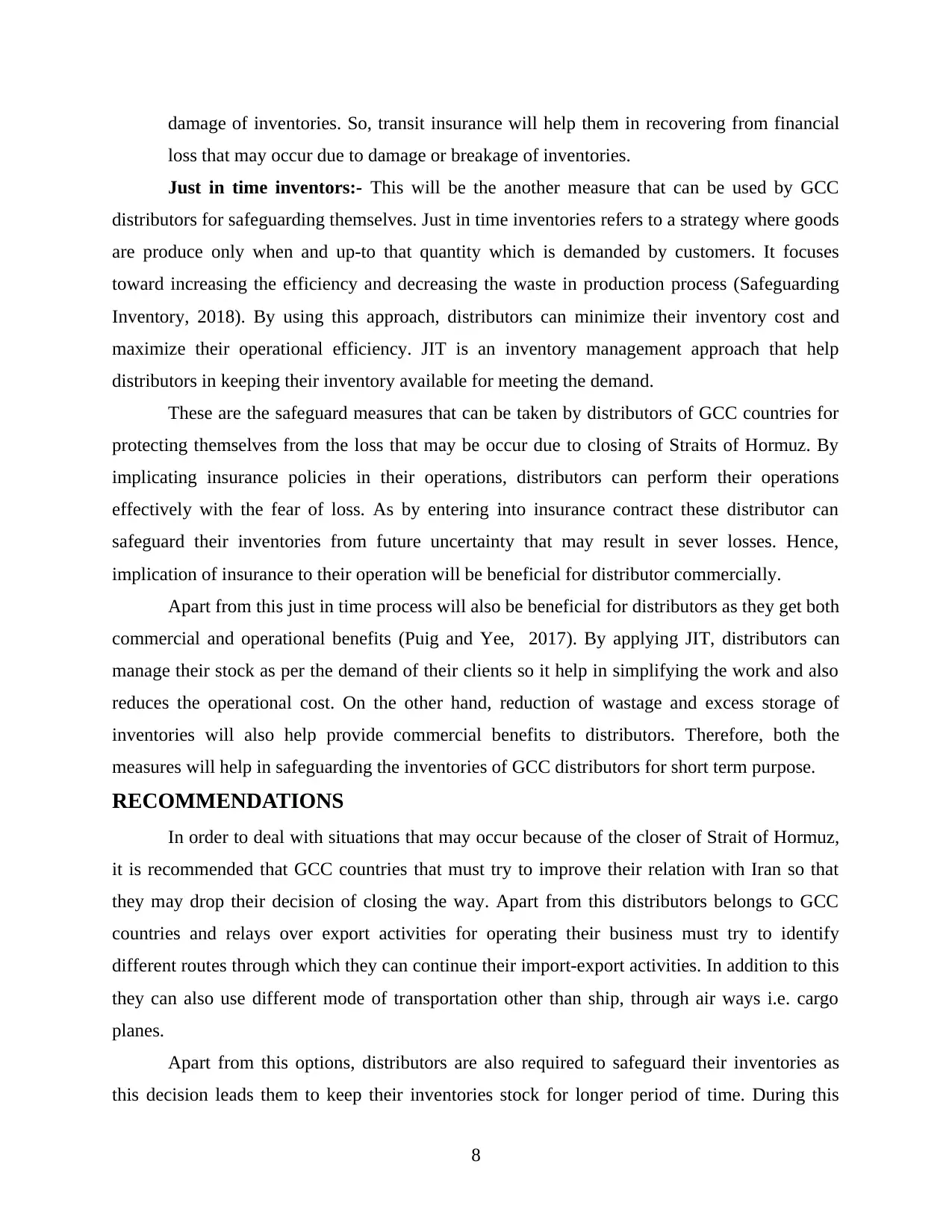
damage of inventories. So, transit insurance will help them in recovering from financial
loss that may occur due to damage or breakage of inventories.
Just in time inventors:- This will be the another measure that can be used by GCC
distributors for safeguarding themselves. Just in time inventories refers to a strategy where goods
are produce only when and up-to that quantity which is demanded by customers. It focuses
toward increasing the efficiency and decreasing the waste in production process (Safeguarding
Inventory, 2018). By using this approach, distributors can minimize their inventory cost and
maximize their operational efficiency. JIT is an inventory management approach that help
distributors in keeping their inventory available for meeting the demand.
These are the safeguard measures that can be taken by distributors of GCC countries for
protecting themselves from the loss that may be occur due to closing of Straits of Hormuz. By
implicating insurance policies in their operations, distributors can perform their operations
effectively with the fear of loss. As by entering into insurance contract these distributor can
safeguard their inventories from future uncertainty that may result in sever losses. Hence,
implication of insurance to their operation will be beneficial for distributor commercially.
Apart from this just in time process will also be beneficial for distributors as they get both
commercial and operational benefits (Puig and Yee, 2017). By applying JIT, distributors can
manage their stock as per the demand of their clients so it help in simplifying the work and also
reduces the operational cost. On the other hand, reduction of wastage and excess storage of
inventories will also help provide commercial benefits to distributors. Therefore, both the
measures will help in safeguarding the inventories of GCC distributors for short term purpose.
RECOMMENDATIONS
In order to deal with situations that may occur because of the closer of Strait of Hormuz,
it is recommended that GCC countries that must try to improve their relation with Iran so that
they may drop their decision of closing the way. Apart from this distributors belongs to GCC
countries and relays over export activities for operating their business must try to identify
different routes through which they can continue their import-export activities. In addition to this
they can also use different mode of transportation other than ship, through air ways i.e. cargo
planes.
Apart from this options, distributors are also required to safeguard their inventories as
this decision leads them to keep their inventories stock for longer period of time. During this
8
loss that may occur due to damage or breakage of inventories.
Just in time inventors:- This will be the another measure that can be used by GCC
distributors for safeguarding themselves. Just in time inventories refers to a strategy where goods
are produce only when and up-to that quantity which is demanded by customers. It focuses
toward increasing the efficiency and decreasing the waste in production process (Safeguarding
Inventory, 2018). By using this approach, distributors can minimize their inventory cost and
maximize their operational efficiency. JIT is an inventory management approach that help
distributors in keeping their inventory available for meeting the demand.
These are the safeguard measures that can be taken by distributors of GCC countries for
protecting themselves from the loss that may be occur due to closing of Straits of Hormuz. By
implicating insurance policies in their operations, distributors can perform their operations
effectively with the fear of loss. As by entering into insurance contract these distributor can
safeguard their inventories from future uncertainty that may result in sever losses. Hence,
implication of insurance to their operation will be beneficial for distributor commercially.
Apart from this just in time process will also be beneficial for distributors as they get both
commercial and operational benefits (Puig and Yee, 2017). By applying JIT, distributors can
manage their stock as per the demand of their clients so it help in simplifying the work and also
reduces the operational cost. On the other hand, reduction of wastage and excess storage of
inventories will also help provide commercial benefits to distributors. Therefore, both the
measures will help in safeguarding the inventories of GCC distributors for short term purpose.
RECOMMENDATIONS
In order to deal with situations that may occur because of the closer of Strait of Hormuz,
it is recommended that GCC countries that must try to improve their relation with Iran so that
they may drop their decision of closing the way. Apart from this distributors belongs to GCC
countries and relays over export activities for operating their business must try to identify
different routes through which they can continue their import-export activities. In addition to this
they can also use different mode of transportation other than ship, through air ways i.e. cargo
planes.
Apart from this options, distributors are also required to safeguard their inventories as
this decision leads them to keep their inventories stock for longer period of time. During this
8
Secure Best Marks with AI Grader
Need help grading? Try our AI Grader for instant feedback on your assignments.
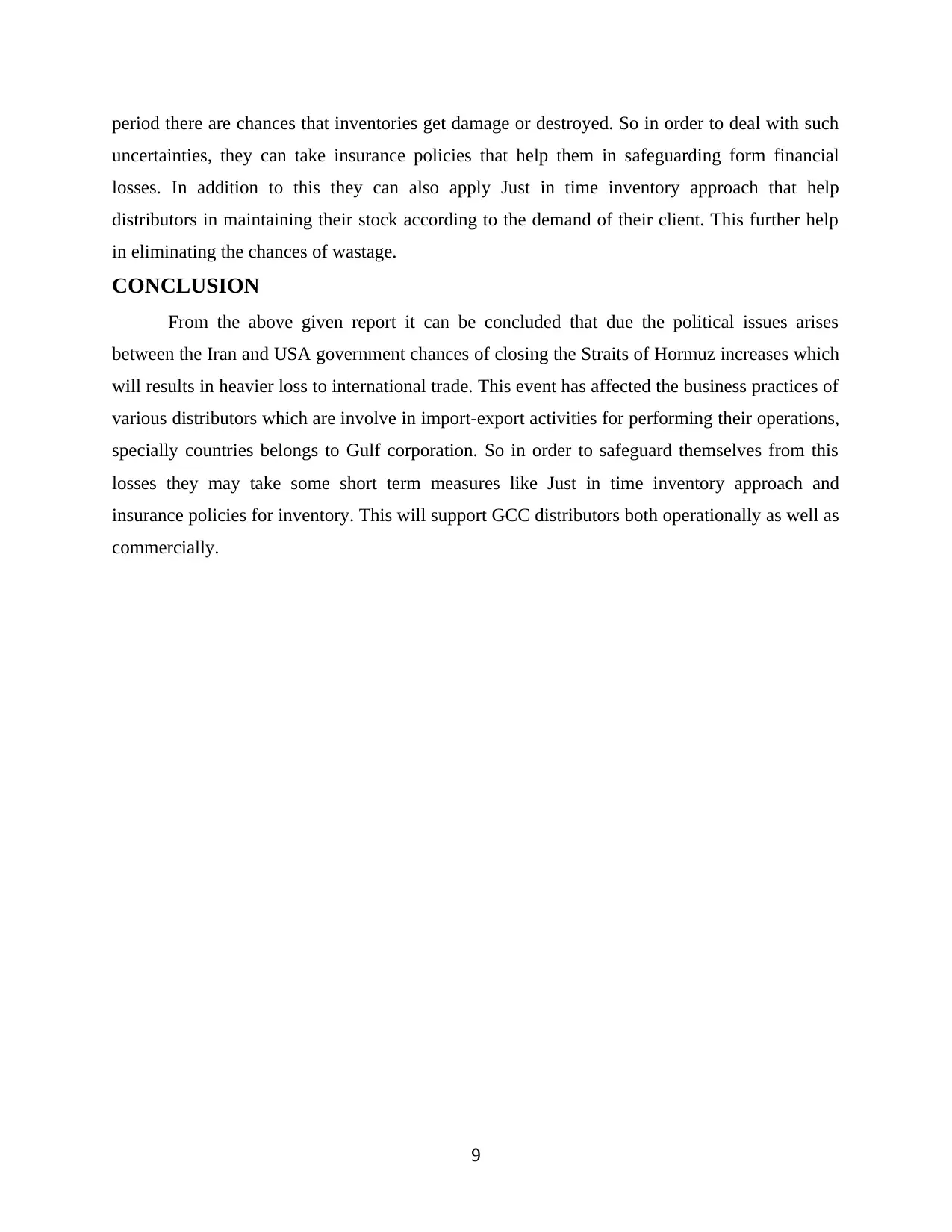
period there are chances that inventories get damage or destroyed. So in order to deal with such
uncertainties, they can take insurance policies that help them in safeguarding form financial
losses. In addition to this they can also apply Just in time inventory approach that help
distributors in maintaining their stock according to the demand of their client. This further help
in eliminating the chances of wastage.
CONCLUSION
From the above given report it can be concluded that due the political issues arises
between the Iran and USA government chances of closing the Straits of Hormuz increases which
will results in heavier loss to international trade. This event has affected the business practices of
various distributors which are involve in import-export activities for performing their operations,
specially countries belongs to Gulf corporation. So in order to safeguard themselves from this
losses they may take some short term measures like Just in time inventory approach and
insurance policies for inventory. This will support GCC distributors both operationally as well as
commercially.
9
uncertainties, they can take insurance policies that help them in safeguarding form financial
losses. In addition to this they can also apply Just in time inventory approach that help
distributors in maintaining their stock according to the demand of their client. This further help
in eliminating the chances of wastage.
CONCLUSION
From the above given report it can be concluded that due the political issues arises
between the Iran and USA government chances of closing the Straits of Hormuz increases which
will results in heavier loss to international trade. This event has affected the business practices of
various distributors which are involve in import-export activities for performing their operations,
specially countries belongs to Gulf corporation. So in order to safeguard themselves from this
losses they may take some short term measures like Just in time inventory approach and
insurance policies for inventory. This will support GCC distributors both operationally as well as
commercially.
9
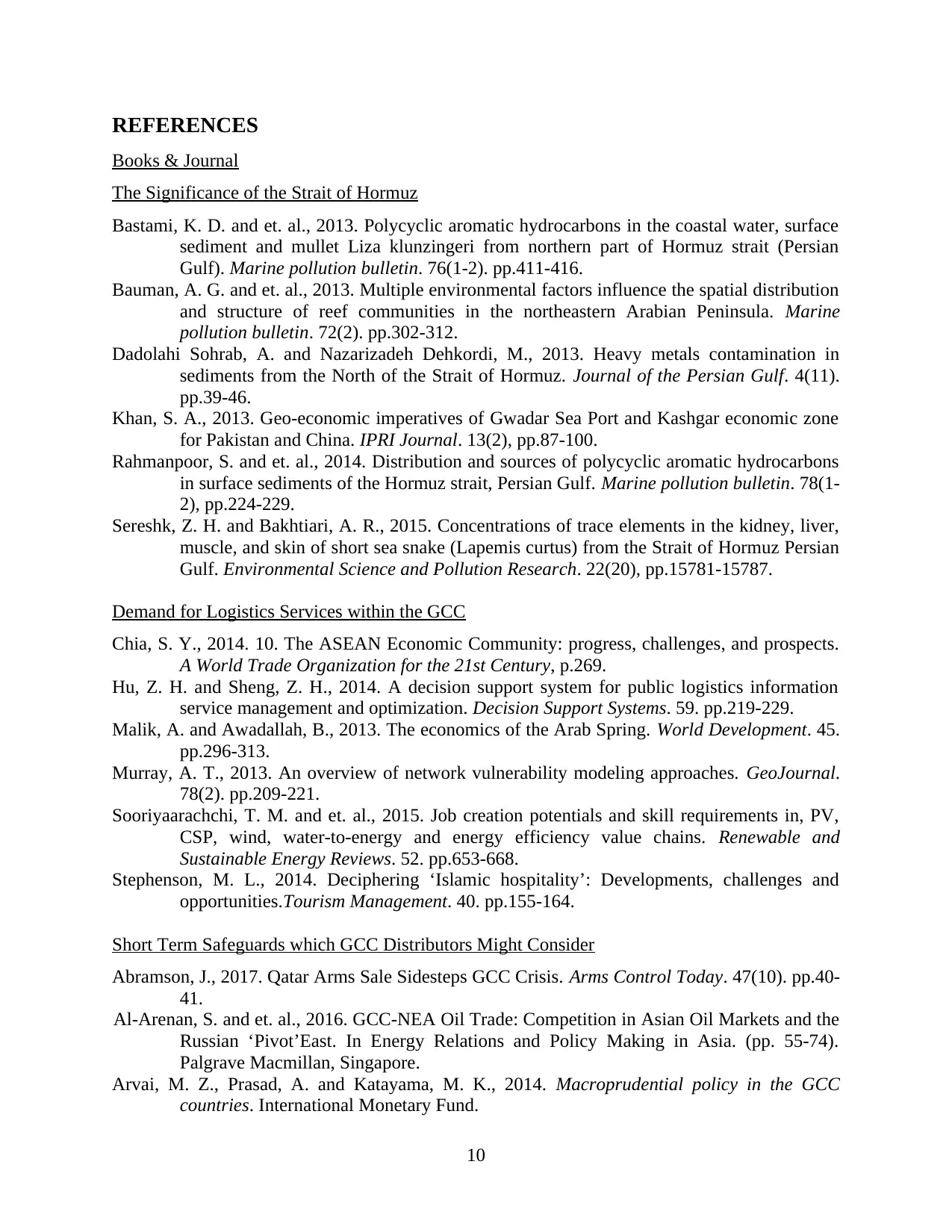
REFERENCES
Books & Journal
The Significance of the Strait of Hormuz
Bastami, K. D. and et. al., 2013. Polycyclic aromatic hydrocarbons in the coastal water, surface
sediment and mullet Liza klunzingeri from northern part of Hormuz strait (Persian
Gulf). Marine pollution bulletin. 76(1-2). pp.411-416.
Bauman, A. G. and et. al., 2013. Multiple environmental factors influence the spatial distribution
and structure of reef communities in the northeastern Arabian Peninsula. Marine
pollution bulletin. 72(2). pp.302-312.
Dadolahi Sohrab, A. and Nazarizadeh Dehkordi, M., 2013. Heavy metals contamination in
sediments from the North of the Strait of Hormuz. Journal of the Persian Gulf. 4(11).
pp.39-46.
Khan, S. A., 2013. Geo-economic imperatives of Gwadar Sea Port and Kashgar economic zone
for Pakistan and China. IPRI Journal. 13(2), pp.87-100.
Rahmanpoor, S. and et. al., 2014. Distribution and sources of polycyclic aromatic hydrocarbons
in surface sediments of the Hormuz strait, Persian Gulf. Marine pollution bulletin. 78(1-
2), pp.224-229.
Sereshk, Z. H. and Bakhtiari, A. R., 2015. Concentrations of trace elements in the kidney, liver,
muscle, and skin of short sea snake (Lapemis curtus) from the Strait of Hormuz Persian
Gulf. Environmental Science and Pollution Research. 22(20), pp.15781-15787.
Demand for Logistics Services within the GCC
Chia, S. Y., 2014. 10. The ASEAN Economic Community: progress, challenges, and prospects.
A World Trade Organization for the 21st Century, p.269.
Hu, Z. H. and Sheng, Z. H., 2014. A decision support system for public logistics information
service management and optimization. Decision Support Systems. 59. pp.219-229.
Malik, A. and Awadallah, B., 2013. The economics of the Arab Spring. World Development. 45.
pp.296-313.
Murray, A. T., 2013. An overview of network vulnerability modeling approaches. GeoJournal.
78(2). pp.209-221.
Sooriyaarachchi, T. M. and et. al., 2015. Job creation potentials and skill requirements in, PV,
CSP, wind, water-to-energy and energy efficiency value chains. Renewable and
Sustainable Energy Reviews. 52. pp.653-668.
Stephenson, M. L., 2014. Deciphering ‘Islamic hospitality’: Developments, challenges and
opportunities.Tourism Management. 40. pp.155-164.
Short Term Safeguards which GCC Distributors Might Consider
Abramson, J., 2017. Qatar Arms Sale Sidesteps GCC Crisis. Arms Control Today. 47(10). pp.40-
41.
Al-Arenan, S. and et. al., 2016. GCC-NEA Oil Trade: Competition in Asian Oil Markets and the
Russian ‘Pivot’East. In Energy Relations and Policy Making in Asia. (pp. 55-74).
Palgrave Macmillan, Singapore.
Arvai, M. Z., Prasad, A. and Katayama, M. K., 2014. Macroprudential policy in the GCC
countries. International Monetary Fund.
10
Books & Journal
The Significance of the Strait of Hormuz
Bastami, K. D. and et. al., 2013. Polycyclic aromatic hydrocarbons in the coastal water, surface
sediment and mullet Liza klunzingeri from northern part of Hormuz strait (Persian
Gulf). Marine pollution bulletin. 76(1-2). pp.411-416.
Bauman, A. G. and et. al., 2013. Multiple environmental factors influence the spatial distribution
and structure of reef communities in the northeastern Arabian Peninsula. Marine
pollution bulletin. 72(2). pp.302-312.
Dadolahi Sohrab, A. and Nazarizadeh Dehkordi, M., 2013. Heavy metals contamination in
sediments from the North of the Strait of Hormuz. Journal of the Persian Gulf. 4(11).
pp.39-46.
Khan, S. A., 2013. Geo-economic imperatives of Gwadar Sea Port and Kashgar economic zone
for Pakistan and China. IPRI Journal. 13(2), pp.87-100.
Rahmanpoor, S. and et. al., 2014. Distribution and sources of polycyclic aromatic hydrocarbons
in surface sediments of the Hormuz strait, Persian Gulf. Marine pollution bulletin. 78(1-
2), pp.224-229.
Sereshk, Z. H. and Bakhtiari, A. R., 2015. Concentrations of trace elements in the kidney, liver,
muscle, and skin of short sea snake (Lapemis curtus) from the Strait of Hormuz Persian
Gulf. Environmental Science and Pollution Research. 22(20), pp.15781-15787.
Demand for Logistics Services within the GCC
Chia, S. Y., 2014. 10. The ASEAN Economic Community: progress, challenges, and prospects.
A World Trade Organization for the 21st Century, p.269.
Hu, Z. H. and Sheng, Z. H., 2014. A decision support system for public logistics information
service management and optimization. Decision Support Systems. 59. pp.219-229.
Malik, A. and Awadallah, B., 2013. The economics of the Arab Spring. World Development. 45.
pp.296-313.
Murray, A. T., 2013. An overview of network vulnerability modeling approaches. GeoJournal.
78(2). pp.209-221.
Sooriyaarachchi, T. M. and et. al., 2015. Job creation potentials and skill requirements in, PV,
CSP, wind, water-to-energy and energy efficiency value chains. Renewable and
Sustainable Energy Reviews. 52. pp.653-668.
Stephenson, M. L., 2014. Deciphering ‘Islamic hospitality’: Developments, challenges and
opportunities.Tourism Management. 40. pp.155-164.
Short Term Safeguards which GCC Distributors Might Consider
Abramson, J., 2017. Qatar Arms Sale Sidesteps GCC Crisis. Arms Control Today. 47(10). pp.40-
41.
Al-Arenan, S. and et. al., 2016. GCC-NEA Oil Trade: Competition in Asian Oil Markets and the
Russian ‘Pivot’East. In Energy Relations and Policy Making in Asia. (pp. 55-74).
Palgrave Macmillan, Singapore.
Arvai, M. Z., Prasad, A. and Katayama, M. K., 2014. Macroprudential policy in the GCC
countries. International Monetary Fund.
10
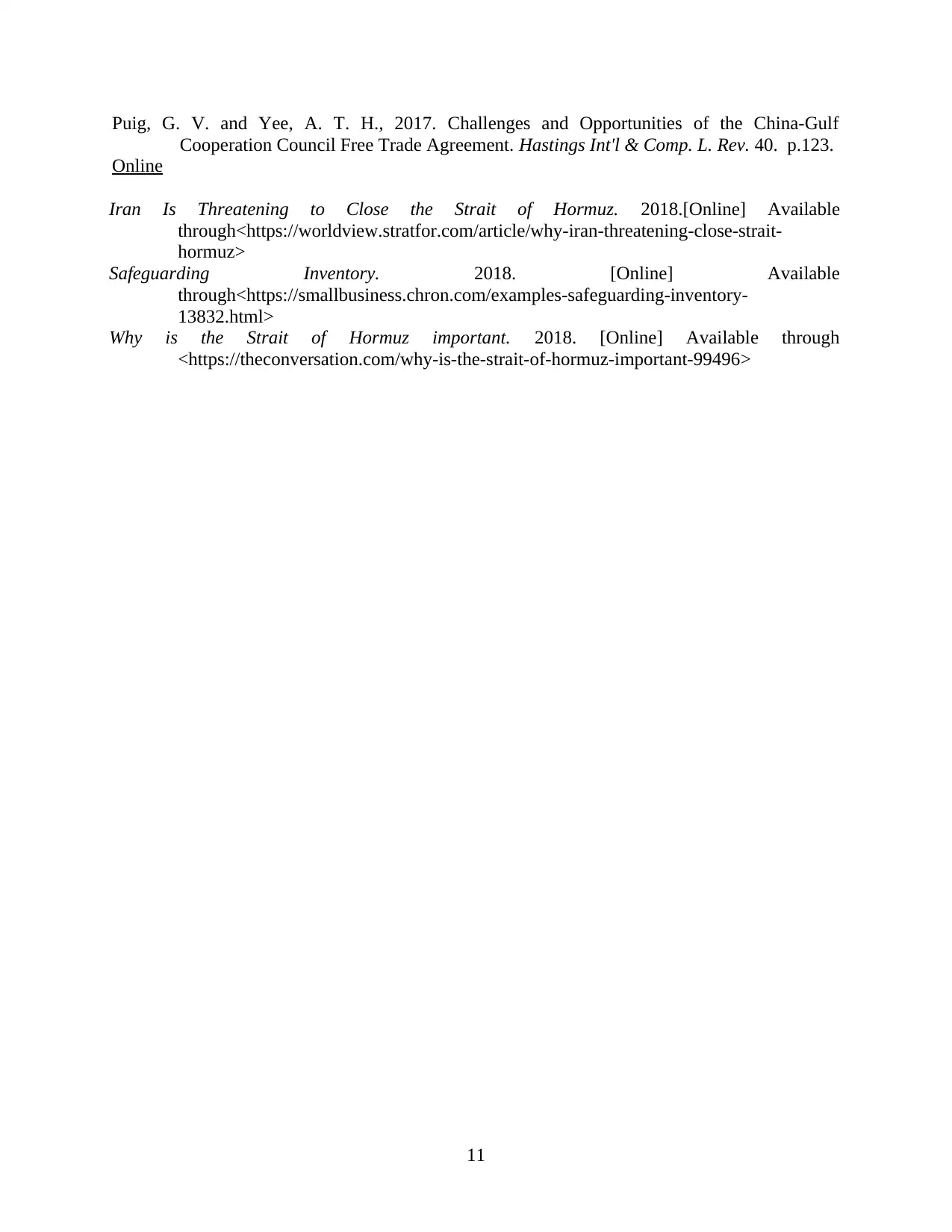
Puig, G. V. and Yee, A. T. H., 2017. Challenges and Opportunities of the China-Gulf
Cooperation Council Free Trade Agreement. Hastings Int'l & Comp. L. Rev. 40. p.123.
Online
Iran Is Threatening to Close the Strait of Hormuz. 2018.[Online] Available
through<https://worldview.stratfor.com/article/why-iran-threatening-close-strait-
hormuz>
Safeguarding Inventory. 2018. [Online] Available
through<https://smallbusiness.chron.com/examples-safeguarding-inventory-
13832.html>
Why is the Strait of Hormuz important. 2018. [Online] Available through
<https://theconversation.com/why-is-the-strait-of-hormuz-important-99496>
11
Cooperation Council Free Trade Agreement. Hastings Int'l & Comp. L. Rev. 40. p.123.
Online
Iran Is Threatening to Close the Strait of Hormuz. 2018.[Online] Available
through<https://worldview.stratfor.com/article/why-iran-threatening-close-strait-
hormuz>
Safeguarding Inventory. 2018. [Online] Available
through<https://smallbusiness.chron.com/examples-safeguarding-inventory-
13832.html>
Why is the Strait of Hormuz important. 2018. [Online] Available through
<https://theconversation.com/why-is-the-strait-of-hormuz-important-99496>
11
1 out of 13
Your All-in-One AI-Powered Toolkit for Academic Success.
+13062052269
info@desklib.com
Available 24*7 on WhatsApp / Email
![[object Object]](/_next/static/media/star-bottom.7253800d.svg)
Unlock your academic potential
© 2024 | Zucol Services PVT LTD | All rights reserved.